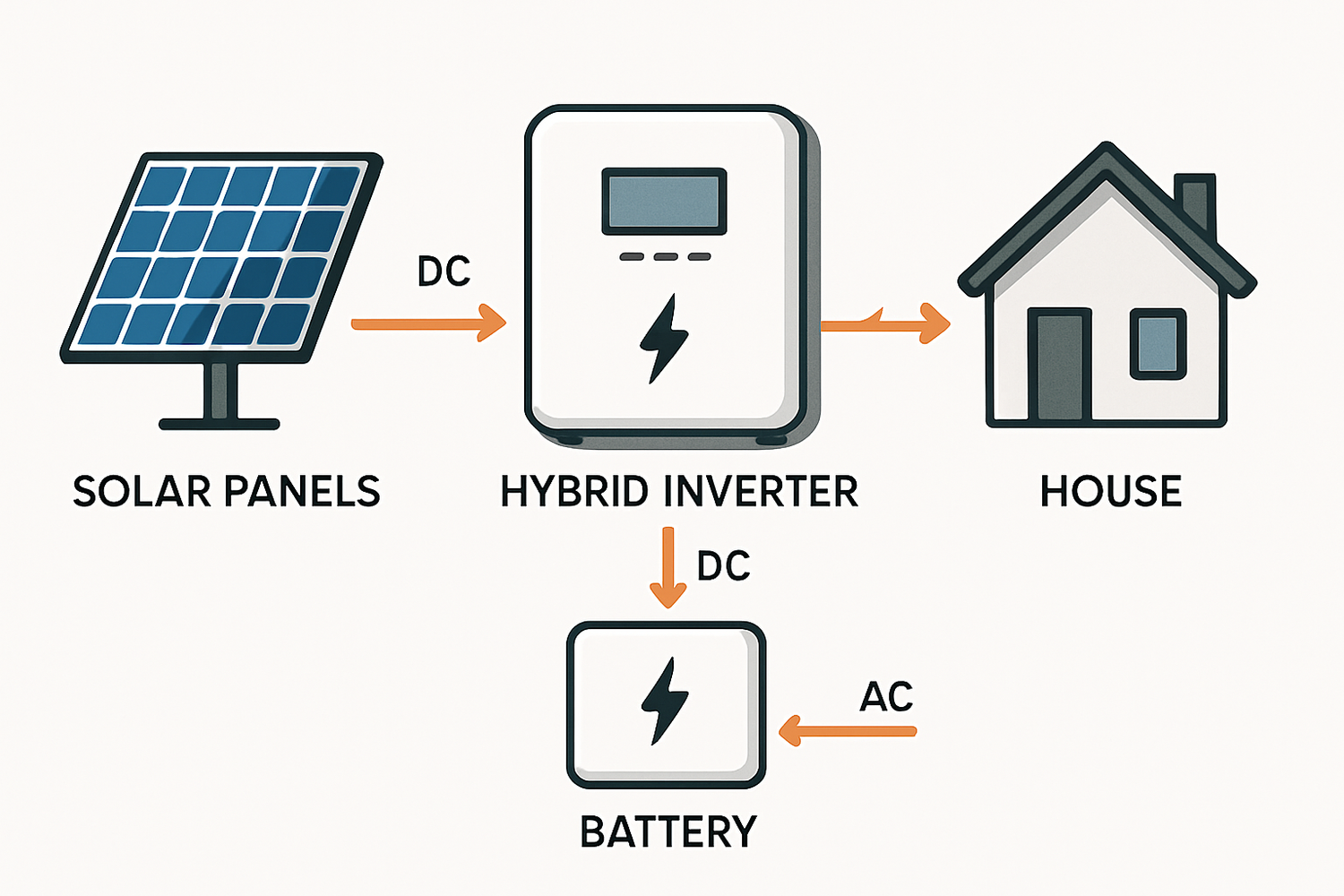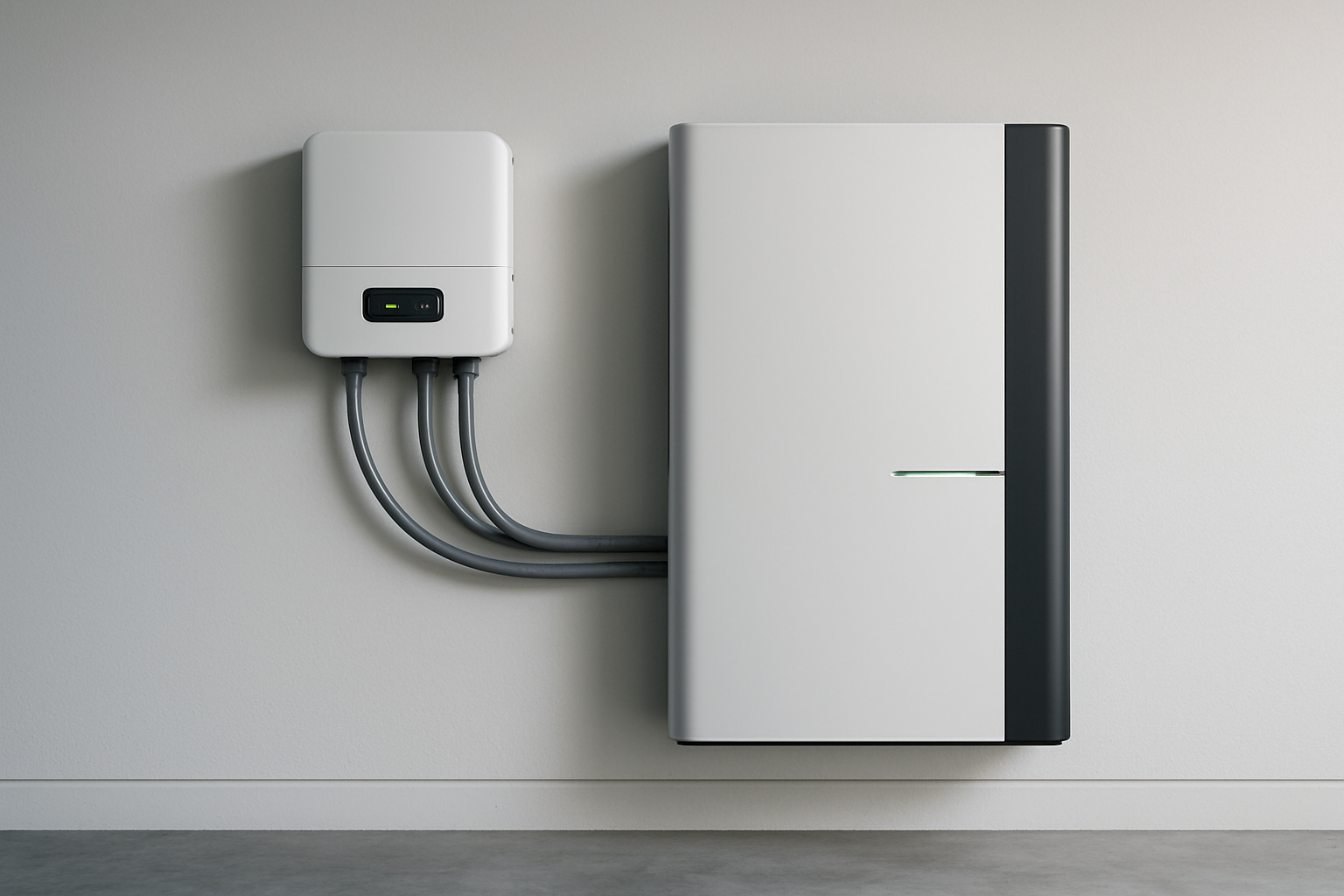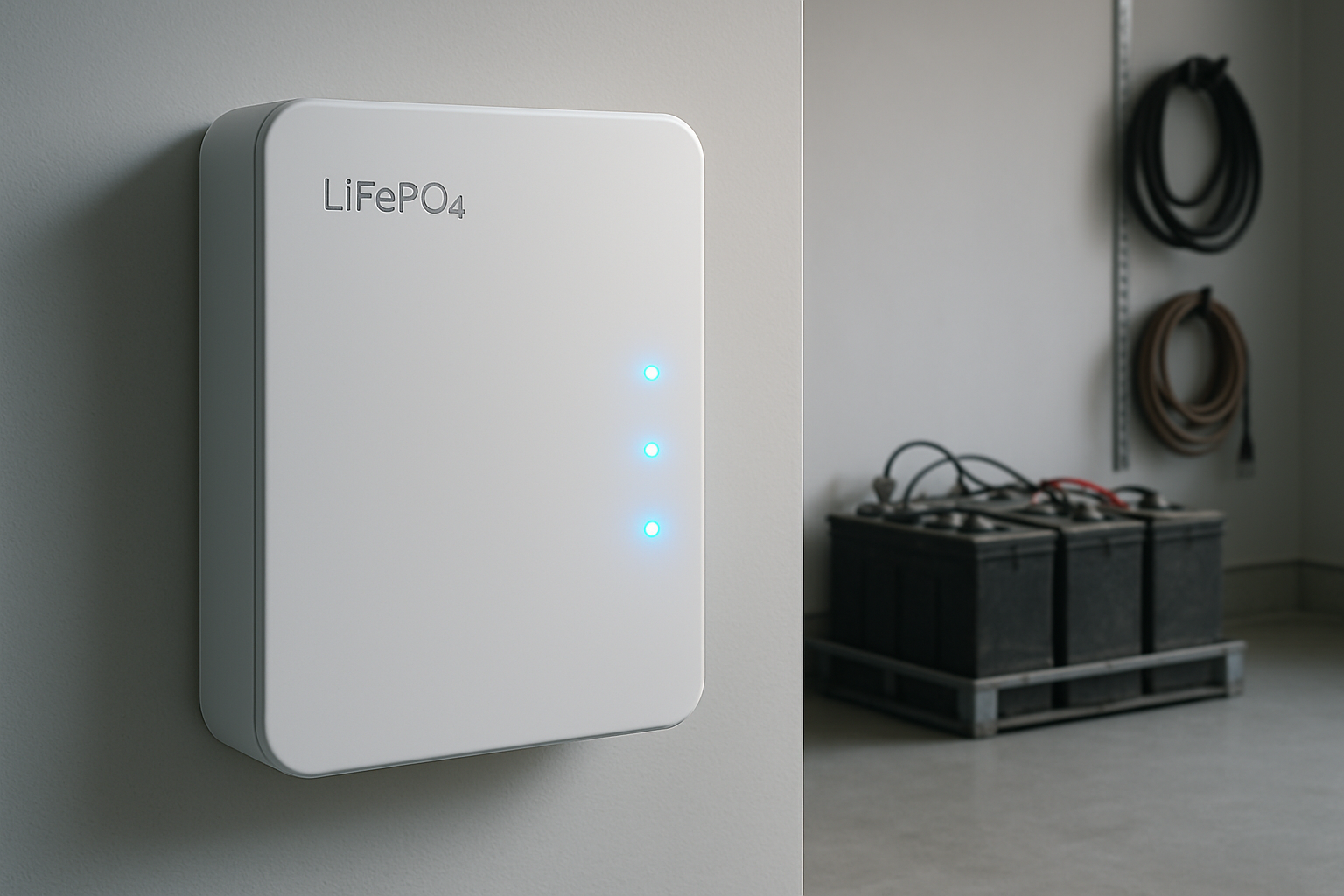Adding a solar battery to your home installation is a significant step toward energy independence. It allows you to store the excess energy your panels generate during the day for use at night or during a power outage. As you look at your options, you will encounter a key technical choice: should you use an AC-coupled or a DC-coupled system? The answer depends entirely on your specific situation, including whether you have an existing solar panel system or are starting fresh.
Understanding the Basics: AC and DC Electricity in Your Solar System
To make an informed decision, it’s helpful to understand the two types of electricity flowing through your home energy system. The choice between AC and DC coupling is all about how and when your solar energy is converted.
What is DC Electricity?
Direct Current (DC) is the type of electricity your solar panels produce and what your solar battery stores. Think of it as a one-way street where energy flows in a single, constant direction. This is the native language of solar panels and batteries.
What is AC Electricity?
Alternating Current (AC) is the electricity that powers the appliances in your home, from your refrigerator to your television. It’s also the type of electricity supplied by the utility grid. Unlike DC, AC power rapidly switches direction, making it suitable for long-distance transmission.
The Role of the Inverter
The inverter is a critical component in any solar installation. Its primary job is to convert DC electricity from your solar panels into usable AC electricity for your home. How this conversion happens in relation to the battery is what defines AC and DC coupling. According to the U.S. Department of Energy, inverters are the bridge between solar generation and home energy use.
What is a DC-Coupled Solar Battery System?
In a DC-coupled system, the solar panels, charge controller, and battery are all connected on the DC side of the system. A single, powerful hybrid inverter then converts the stored DC power from the battery into AC power for your home when it's needed.
How DC Coupling Works
The energy path is direct and efficient: DC power from the solar panels travels through a charge controller straight to the battery for storage. Because the energy is stored in its original DC form, there are fewer conversion steps. This direct connection makes DC-coupled systems highly efficient for storing solar energy.
Advantages of DC-Coupled Systems
- Higher Efficiency: With fewer DC-to-AC conversions, DC-coupled systems have a higher round-trip efficiency, often around 95-98%. This means less energy is lost in the process of charging the battery.
- Cost-Effective for New Installations: For a new home solar installation that includes a battery from the start, a DC-coupled system is often more economical because it requires only one hybrid inverter.
- Ideal for Off-Grid Applications: The high efficiency and simpler power flow make DC coupling the preferred choice for reliable off-grid solar solutions.
Disadvantages of DC-Coupled Systems
- Complex to Retrofit: Adding a DC-coupled battery to an existing solar panel system can be complicated and costly, often requiring the replacement of the original solar inverter.
- Installation Complexity: The wiring and setup can be more intricate than AC-coupled systems, requiring specialized installation expertise.
What is an AC-Coupled Solar Battery System?
An AC-coupled system essentially treats the solar panels and the battery as two separate systems. The solar panels have their own inverter, and the battery has its own dedicated battery inverter.
How AC Coupling Works
Solar panels generate DC power, which is immediately converted to AC by a solar inverter for home use. If there is excess AC power, it is sent to a second inverter—the battery inverter—which converts it back to DC to charge the battery. When you need to draw power from the battery, it’s converted back to AC again. This process involves three conversions.
Advantages of AC-Coupled Systems
- Easy to Retrofit: AC coupling is the ideal solution for adding a battery to an existing solar installation. It works with almost any existing grid-tied solar inverter, minimizing disruption.
- Greater Flexibility: These systems are modular. You can use different brands for your solar inverter and battery inverter, offering more choices in system design.
- System Redundancy: Since there are two inverters, if one fails, the other part of the system may continue to operate.
Disadvantages of AC-Coupled Systems
- Slightly Lower Efficiency: The multiple energy conversions (DC to AC, then AC to DC, and back to AC) result in a slightly lower round-trip efficiency, typically between 90-94%.
- Higher Cost: The need for two separate inverters can sometimes make AC-coupled systems more expensive, particularly for new installations.
Head-to-Head Comparison: AC vs. DC Coupling
The best choice depends on your specific needs. Here is a direct comparison to help you decide.
| Feature | AC-Coupled System | DC-Coupled System |
|---|---|---|
| Round-Trip Efficiency | Good (90-94%) | Higher (95-98%) |
| Best for New Systems | Possible, but less common | Ideal and more cost-effective |
| Best for Retrofitting | Ideal and simpler to install | Complex and often costly |
| System Complexity | Lower, more modular | Higher, more integrated |
| Off-Grid Suitability | Possible but less efficient | Excellent |
Efficiency and Performance
While a DC-coupled system is technically more efficient, the difference of a few percentage points may not be the deciding factor for everyone. The convenience and lower upfront cost of retrofitting an AC-coupled system can outweigh the small efficiency gain. Furthermore, as highlighted in the ultimate reference on solar storage performance, overall system performance is also heavily influenced by the quality of its components. High-performance Lithium Iron Phosphate (LiFePO4) batteries, for example, contribute significantly to a system's longevity, safety, and usable energy, regardless of the coupling method.
Making the Right Choice for Your Home
The decision between AC and DC coupling is a practical one. It’s not about which technology is superior overall, but which is the right fit for your home solar installation.
Choose a DC-Coupled System If:
- You are installing a brand-new solar panel and battery system at the same time.
- Maximizing every bit of energy efficiency is your top priority.
- You are building an off-grid home, farm, or cabin where reliability and efficiency are paramount.
Choose an AC-Coupled System If:
- You already have a grid-tied solar panel system and want to add battery storage.
- You value flexibility and want the option to mix and match components from different manufacturers.
- You want a modular system that is easy to expand in the future.
A Final Thought
Ultimately, both AC and DC-coupled systems provide a reliable way to store solar energy and increase your energy independence. The growth in renewable energy, as tracked by organizations like the International Energy Agency (IEA), shows a clear trend towards integrating storage to make solar power available 24/7. Your choice will hinge on your starting point—a new installation or an existing one—and your long-term energy goals. Consulting with a qualified solar professional can help you design a system that perfectly matches your needs.
Disclaimer: This article is for informational purposes only and does not constitute financial or investment advice. Please consult with a professional advisor before making any decisions.
Frequently Asked Questions
Can you add a battery to any solar panel system?
Yes, in most cases, you can add a battery to an existing solar panel system. An AC-coupled system is the most common and straightforward method for retrofitting a battery, as it can be installed with minimal changes to your current setup.
Is one system safer than the other?
Both AC and DC-coupled systems are safe when installed correctly by certified professionals using high-quality components. Safety is determined by the quality of the equipment and the installation, not the coupling method. Modern energy storage systems are designed with multiple safety features, including thermal management and overcharge protection.
How does coupling affect my ability to go off-grid?
DC-coupled systems are generally considered more efficient and better suited for off-grid applications. The power flows more directly from the solar panels to the battery, which is ideal for a self-contained system. While AC-coupled systems can be configured for off-grid use, it's a more complex and less common approach.
Which system is better for future expansion?
AC-coupled systems generally offer more flexibility for future expansion. Because the system is modular, you can more easily add another battery and its own inverter without having to redesign the entire solar array. Expanding a DC-coupled system can be more restrictive, as it is often limited by the capacity of the single hybrid inverter.





Leave a comment
All comments are moderated before being published.
This site is protected by hCaptcha and the hCaptcha Privacy Policy and Terms of Service apply.